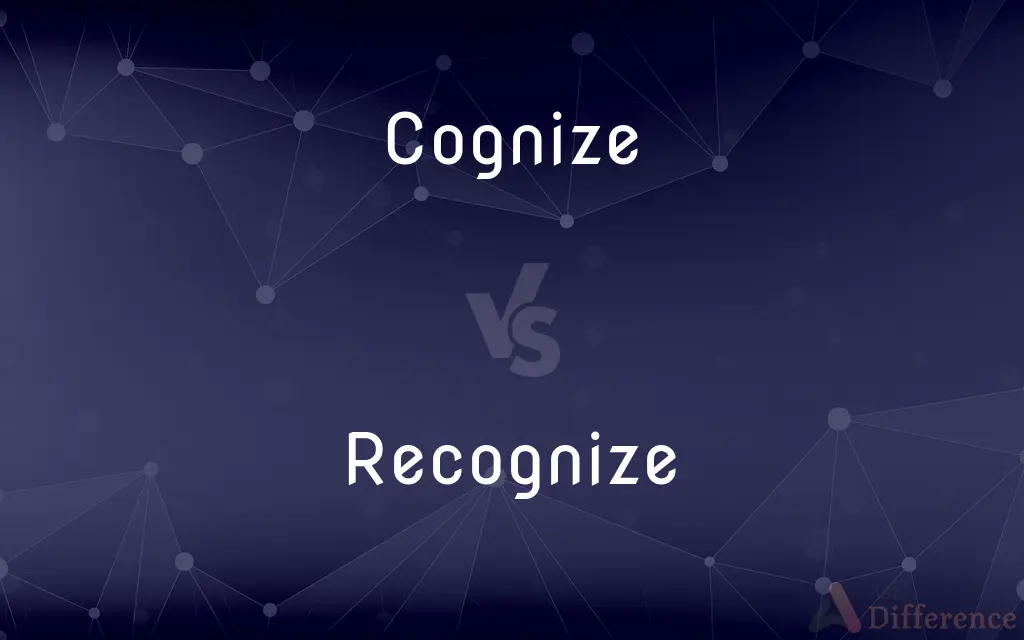Cognize vs. Recognize — What's the Difference?
Edited by Tayyaba Rehman — By Urooj Arif — Updated on May 2, 2024
Cognize refers to the process of knowing or becoming aware of something, emphasizing the acquisition of knowledge; recognize involves identifying something previously known.

Difference Between Cognize and Recognize
Table of Contents
ADVERTISEMENT
Key Differences
Cognize involves the mental process of knowing or becoming aware of information or concepts, focusing on the acquisition and understanding of new knowledge. On the other hand, recognize primarily deals with the identification or acknowledgment of something that was previously seen, known, or experienced.
In the realm of cognitive psychology, cognize refers to the comprehension or assimilation of information, where the emphasis is on processing and understanding new data. Whereas, recognize pertains to recalling or confirming the familiarity of information or sensory perceptions against past experiences or knowledge.
When someone cognizes, they are actively engaging in the process of learning and understanding through observation or study. Conversely, recognizing something involves a sense of familiarity and recall, often triggered by specific cues or contexts that have been encountered before.
Cognize can also relate to the initial discovery or realization of concepts, where there is no prior knowledge. On the other hand, recognize requires a pre-existing framework or memory to match with current perceptions or facts.
The act of cognizing is fundamental in educational contexts where acquiring new knowledge is the goal. Whereas, recognition plays a critical role in everyday situations, such as recognizing faces, places, or objects, which relies on previously stored information in the brain.
ADVERTISEMENT
Comparison Chart
Definition
To become aware of or know something
To identify something already known
Focus
Acquisition of knowledge
Identification based on memory
Cognitive Process
Learning and understanding
Memory recall
Required Knowledge
None initially
Pre-existing knowledge or experience
Common Usage
More abstract, less common in everyday speech
Widely used in daily conversations
Compare with Definitions
Cognize
To be aware of through the senses or mind.
She began to cognize the complexity of the situation as she gathered more information.
Recognize
To perceive as existing or true.
He recognized the importance of staying calm under pressure.
Cognize
To come to know something newly.
The students are learning to cognize mathematical concepts.
Recognize
To identify someone or something seen before.
He recognized his friend from across the street.
Cognize
To acknowledge or realize for the first time.
She cognized her potential in the new role.
Recognize
To show official appreciation for.
The award recognizes his years of service to the community.
Cognize
To perceive or conceive as new knowledge.
Philosophers attempt to cognize the deeper meanings of existence.
Recognize
To realize or admit that something is true.
She recognized the need for change in the department.
Cognize
To comprehend or understand new information.
He tries to cognize the basics of quantum mechanics.
Recognize
To acknowledge the existence or legality of something.
The country recognizes the new ambassador.
Cognize
To know, perceive, or become aware of.
Recognize
To know to be something that has been perceived before
Recognize a face.
Cognize
To make into an object of cognition (the process of acquiring knowledge through thought); to cogitate.
Recognize
To know or identify from past experience or knowledge
Recognize hostility.
Cognize
To know or perceive; to recognize.
The reasoning faculty can deal with no facts until they are cognized by it.
Recognize
To perceive or show acceptance of the validity or reality of
Recognizes the concerns of the tenants.
Cognize
Be cognizant or aware of a fact or a specific piece of information; possess knowledge or information about;
I know that the President lied to the people
I want to know who is winning the game!
I know it's time
Recognize
To permit to address a meeting
The club's president recognized the new member.
Recognize
To accept officially the national status of as a new government.
Recognize
To show awareness of; approve of or appreciate
Recognize services rendered.
Recognize
To admit the acquaintance of, as by salutation
Recognize an old friend with a cheerful greeting.
Recognize
(Law) To enter into a recognizance.
Recognize
(Biology) To exhibit recognition for (an antigen or a substrate, for example).
Recognize
(transitive) To match (something or someone which one currently perceives) to a memory of some previous encounter with the same person or thing.
I recognised his face immediately, although his voice was different.
Recognize
(transitive) To acknowledge the existence or legality of; to treat as valid or worthy of consideration.
The US and a number of EU countries are expected to recognize Kosovo on Monday.
Recognize
To acknowledge or consider (as being a certain thing or having a certain quality or property).
Slavery is widely recognized as immoral.
I recognize that my behaviour has been unacceptable.
Recognize
(transitive) To realize or discover the nature of something; apprehend quality in.
Recognize
(transitive) To show formal appreciation of, as with an award, commendation etc.
His services were recognized in a testimonial.
The soldier was recognized in dispatches.
Recognize
(obsolete) To review; to examine again.
Recognize
(obsolete) To reconnoiter.
Recognize
(immunology) To have the property to bind to specific antigens.
Recognize
To cognize again
Recognize
To know again; to perceive the identity of, with a person or thing previously known; to recover or recall knowledge of.
Speak, vassal; recognize thy sovereign queen.
Recognize
To avow knowledge of; to allow that one knows; to consent to admit, hold, or the like; to admit with a formal acknowledgment; as, to recognize an obligation; to recognize a consul.
Recognize
To acknowledge acquaintance with, as by salutation, bowing, or the like.
Recognize
To show appreciation of; as, to recognize services by a testimonial.
Recognize
To review; to reëxamine.
Recognize
To reconnoiter.
Recognize
To enter an obligation of record before a proper tribunal; as, A B recognized in the sum of twenty dollars.
Recognize
Accept (someone) to be what is claimed or accept his power and authority;
The Crown Prince was acknowledged as the true heir to the throne
We do not recognize your gods
Recognize
Be fully aware or cognizant of
Recognize
Detect with the senses;
The fleeing convicts were picked out of the darkness by the watchful prison guards
I can't make out the faces in this photograph
Recognize
Perceive to be the same
Recognize
Grant credentials to;
The Regents officially recognized the new educational institution
Recognize an academic degree
Recognize
Express greetings upon meeting someone
Recognize
Express obligation, thanks, or gratitude for;
We must acknowledge the kindness she showed towards us
Recognize
Exhibit recognition for (an antigen or a substrate)
Recognize
Show approval or appreciation of;
My work is not recognized by anybody!
The best student was recognized by the Dean
Common Curiosities
What does cognize mean in psychology?
In psychology, cognize means to comprehend or assimilate new information or concepts.
Is it easier to cognize or recognize new information?
It often depends on the context and the individual's learning style, but generally, recognizing is easier as it involves recalling known information.
Does recognition always require visual cues?
No, recognition can also be based on auditory, tactile, or other sensory cues.
How is cognize used in philosophy?
In philosophy, cognize is often used to describe the process of arriving at new insights or understandings through reasoning.
How do children learn to cognize new words?
Children learn to cognize new words through repeated exposure, context clues, and direct teaching.
What role does recognition play in consumer behavior?
Recognition plays a critical role in consumer behavior as familiar brands or products tend to be chosen over unfamiliar ones.
Can you recognize someone without having seen them before?
Recognizing someone generally involves having seen them before; otherwise, it's more about inferring or assuming identity based on other clues.
Why is recognition important in learning?
Recognition helps in reinforcing memory and understanding, making it easier to retrieve information when needed.
How can educators enhance students' ability to cognize new concepts?
Educators can enhance cognition by using varied teaching methods, engaging materials, and interactive discussions.
Are there disorders that affect one's ability to cognize?
Yes, disorders such as Alzheimer's disease and other forms of dementia can affect one’s ability to cognize new information.
Can recognition be improved with practice?
Yes, recognition can be improved with practice, such as through memory exercises or continued exposure to the material.
What makes recognition different from recall?
Recognition involves identifying information in the presence of cues, whereas recall requires retrieving information without external cues.
What is the neurological basis of cognizing?
Cognizing involves various brain regions, primarily the frontal and parietal lobes, which are responsible for processing and understanding information.
How does aging affect one's ability to recognize faces?
Aging can impair the ability to recognize faces due to the decline in cognitive and sensory abilities.
What is the first step in the cognitive process of recognizing?
The first step is often the detection of a familiar stimulus, which then triggers memory recall.
Share Your Discovery

Previous Comparison
Ramen vs. Pizza
Next Comparison
Mandrel vs. ColletAuthor Spotlight
Written by
Urooj ArifUrooj is a skilled content writer at Ask Difference, known for her exceptional ability to simplify complex topics into engaging and informative content. With a passion for research and a flair for clear, concise writing, she consistently delivers articles that resonate with our diverse audience.
Edited by
Tayyaba RehmanTayyaba Rehman is a distinguished writer, currently serving as a primary contributor to askdifference.com. As a researcher in semantics and etymology, Tayyaba's passion for the complexity of languages and their distinctions has found a perfect home on the platform. Tayyaba delves into the intricacies of language, distinguishing between commonly confused words and phrases, thereby providing clarity for readers worldwide.
















































